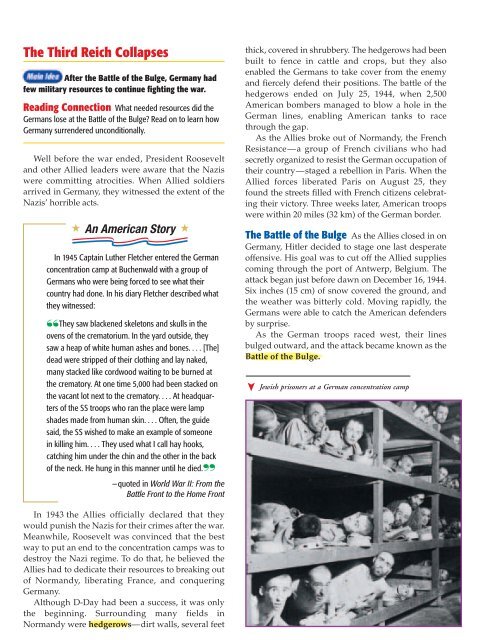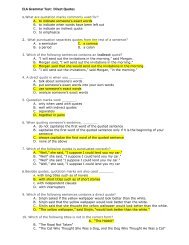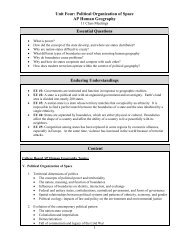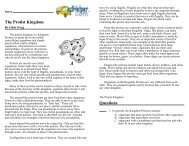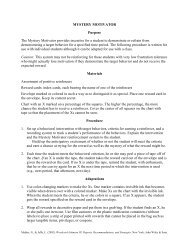Chapter 12: America and World War II, 1941-1945 - Georgia ...
Chapter 12: America and World War II, 1941-1945 - Georgia ...
Chapter 12: America and World War II, 1941-1945 - Georgia ...
Create successful ePaper yourself
Turn your PDF publications into a flip-book with our unique Google optimized e-Paper software.
The Third Reich Collapses<br />
After the Battle of the Bulge, Germany had<br />
few military resources to continue fighting the war.<br />
Reading Connection What needed resources did the<br />
Germans lose at the Battle of the Bulge? Read on to learn how<br />
Germany surrendered unconditionally.<br />
Well before the war ended, President Roosevelt<br />
<strong>and</strong> other Allied leaders were aware that the Nazis<br />
were committing atrocities. When Allied soldiers<br />
arrived in Germany, they witnessed the extent of the<br />
Nazis’ horrible acts.<br />
In <strong>1945</strong> Captain Luther Fletcher entered the German<br />
concentration camp at Buchenwald with a group of<br />
Germans who were being forced to see what their<br />
country had done. In his diary Fletcher described what<br />
they witnessed:<br />
They saw blackened skeletons <strong>and</strong> skulls in the<br />
“<br />
ovens of the crematorium. In the yard outside, they<br />
saw a heap of white human ashes <strong>and</strong> bones. . . . [The]<br />
dead were stripped of their clothing <strong>and</strong> lay naked,<br />
many stacked like cordwood waiting to be burned at<br />
the crematory. At one time 5,000 had been stacked on<br />
the vacant lot next to the crematory.... At headquarters<br />
of the SS troops who ran the place were lamp<br />
shades made from human skin. . . . Often, the guide<br />
said, the SS wished to make an example of someone<br />
in killing him. . . . They used what I call hay hooks,<br />
catching him under the chin <strong>and</strong> the other in the back<br />
of the neck. He hung in this manner until he died.<br />
”<br />
—quoted in <strong>World</strong> <strong>War</strong> <strong>II</strong>: From the<br />
Battle Front to the Home Front<br />
thick, covered in shrubbery. The hedgerows had been<br />
built to fence in cattle <strong>and</strong> crops, but they also<br />
enabled the Germans to take cover from the enemy<br />
<strong>and</strong> fiercely defend their positions. The battle of the<br />
hedgerows ended on July 25, 1944, when 2,500<br />
<strong>America</strong>n bombers managed to blow a hole in the<br />
German lines, enabling <strong>America</strong>n tanks to race<br />
through the gap.<br />
As the Allies broke out of Norm<strong>and</strong>y, the French<br />
Resistance—a group of French civilians who had<br />
secretly organized to resist the German occupation of<br />
their country—staged a rebellion in Paris. When the<br />
Allied forces liberated Paris on August 25, they<br />
found the streets filled with French citizens celebrating<br />
their victory. Three weeks later, <strong>America</strong>n troops<br />
were within 20 miles (32 km) of the German border.<br />
The Battle of the Bulge As the Allies closed in on<br />
Germany, Hitler decided to stage one last desperate<br />
offensive. His goal was to cut off the Allied supplies<br />
coming through the port of Antwerp, Belgium. The<br />
attack began just before dawn on December 16, 1944.<br />
Six inches (15 cm) of snow covered the ground, <strong>and</strong><br />
the weather was bitterly cold. Moving rapidly, the<br />
Germans were able to catch the <strong>America</strong>n defenders<br />
by surprise.<br />
As the German troops raced west, their lines<br />
bulged outward, <strong>and</strong> the attack became known as the<br />
Battle of the Bulge.<br />
➤<br />
Jewish prisoners at a German concentration camp<br />
In 1943 the Allies officially declared that they<br />
would punish the Nazis for their crimes after the war.<br />
Meanwhile, Roosevelt was convinced that the best<br />
way to put an end to the concentration camps was to<br />
destroy the Nazi regime. To do that, he believed the<br />
Allies had to dedicate their resources to breaking out<br />
of Norm<strong>and</strong>y, liberating France, <strong>and</strong> conquering<br />
Germany.<br />
Although D-Day had been a success, it was only<br />
the beginning. Surrounding many fields in<br />
Norm<strong>and</strong>y were hedgerows—dirt walls, several feet<br />
CHAPTER <strong>12</strong> <strong>America</strong> <strong>and</strong> <strong>World</strong> <strong>War</strong> <strong>II</strong> 609


